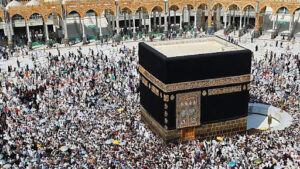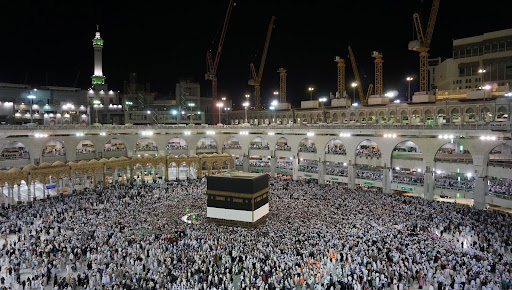Every year, millions of Muslims from around the world embark on a pilgrimage to Mecca for Hajj. This spiritual journey is one of the Five Pillars of Islam and is considered a once-in-a-lifetime obligation for those who are physically and financially able to undertake it.
In this article, we will explore the significance and rituals of the Hajj, and what makes this journey so special for Muslims all over the globe.
History and Origins of the Hajj Pilgrimage
The Hajj pilgrimage is one of the five pillars of Islam and is a religious obligation for all able-bodied Muslims who can afford it. The origins of the Hajj pilgrimage can be traced back to the Prophet Ibrahim and his family.
According to Islamic tradition, Ibrahim was commanded by Allah to leave his wife Hagar and their son Ismail in the desert near the Kaaba. When Hagar ran out of water, she desperately searched for water for her son. It is believed that Allah caused a spring to flow from the ground, which is now known as the Well of Zamzam.
Many years later, Ibrahim received a command from Allah to return to Mecca with his son Ismail to rebuild the Kaaba together and dedicated it to the worship of Allah. This event marks the beginning of the Hajj pilgrimage.
This event has evolved, with various rituals added or modified throughout history. However, the main focus of the pilgrimage remains the same where every year, millions of Muslims from around the world visit the Kaaba and perform a series of rituals following Islamic tradition to fulfill this important religious obligation.
Rituals of the Hajj pilgrimage

The Hajj is the annual Islamic pilgrimage to Mecca, which is considered one of the Five Pillars of Islam. The following rituals are based on the actions of the Prophet Muhammad during his own Hajj pilgrimage and are believed to bring about spiritual purification and a closer relationship with Allah:
- Ihram:
This is the state of ritual purity that all pilgrims must enter before beginning the Hajj. It involves wearing two seamless white sheets of cloth for men, and loose-fitting clothes for women.
- Tawaf:
Pilgrims perform seven anti-clockwise laps around the Kaaba, which is Islam’s holiest shrine located in the center of the Grand Mosque in Mecca.
- Sa’i:
Pilgrims walk/run seven times between the hills of Safa and Marwa, which is believed to represent Hagar’s search for water for her son Ishmael.
- Wuquf:
On the 9th day of Dhu al-Hijjah, the main day of the Hajj, pilgrims stand in Arafat from noon until sunset to ask for forgiveness and mercy from Allah.
- Stoning of the Devil:
Pilgrims throw stones at three walls called Jamarat in Mina, symbolizing their rejection of Satan’s temptations.
- Eid al-Adha:
The final day of the Hajj is celebrated with the festival of Eid al-Adha, where Muslims sacrifice an animal as a symbolic act of Abraham’s willingness to sacrifice his son.
So completing the Hajj pilgrimage is a monumental accomplishment for any Muslim. It is an act of devotion that requires immense physical, emotional, and spiritual preparation, But the rewards of completing the Hajj are numerous and profound.
Significance of the Hajj pilgrimage

The Hajj pilgrimage is one of the most significant religious practices in Islam. It is a mandatory duty for all able-bodied Muslims to perform at least once in their lifetime, provided they have sufficient financial means.
Here are some reasons why the Hajj pilgrimage is significant:
- Fulfillment of religious obligation
The Hajj is one of the Five Pillars of Islam, which are the five basic acts that are mandatory for all Muslims to follow. By performing the Hajj pilgrimage, Muslims fulfill this religious obligation and strengthen their faith.
2. Observing the day of Arafat
The day of Arafat marks the culmination of the Hajj pilgrimage and is considered a day of immense spiritual significance for Muslims. It is also observed as a fasting day by Muslims who are not performing the Hajj pilgrimage.
It is believed that those who perform this ritual with sincerity and devotion will have their sins forgiven and their prayers answered.
3. Unity and equality
The Hajj brings together Muslims from all over the world, regardless of their race, ethnicity, or social status. It is a time when Muslims can come together in unity and equality, all dressed in simple white clothing, symbolizing their commitment to their faith and their willingness to submit to Allah’s will.
5. Spiritual cleansing and forgiveness
The Hajj is also a time for spiritual cleansing and forgiveness. Muslims believe that by performing the Hajj, their sins are forgiven, and they can start afresh with a clean slate.
6. Commemoration of Prophet Ibrahim’s sacrifice
The Hajj also commemorates the sacrifice of Prophet Ibrahim (Abraham) and his family. Muslims believe that Prophet Ibrahim was commanded by Allah to sacrifice his son, Ismail (Ishmael), and his complete obedience to Allah’s command is a symbol of the ultimate submission to Allah’s will.
7. Personal growth and Self-reflection
The Hajj is a challenging and physically demanding journey, and it requires patience, perseverance, and sacrifice. It is an opportunity for Muslims to reflect on their lives, seek forgiveness from Allah, and strive to become better individuals.
8. Social and cultural significance
There are also social and cultural benefits. Pilgrims have the opportunity to meet people from all over the world, learn about different cultures, and form lasting friendships. They also have the chance to witness the global unity of the Muslim community and to feel a sense of belonging and connection to something larger than themselves.
As a conclusion, the Hajj pilgrimage is significant for Muslims as it fulfills a religious obligation, promotes unity and equality, provides spiritual cleansing and forgiveness, commemorates the sacrifice of Prophet Ibrahim, and facilitates personal growth and self-reflection.
As we reflect on the lessons of the Hajj, let us remember the values of unity, equality, and compassion that it embodies. Let us also pray for the health, safety, and well-being of all Muslims around the world, and for a future in which the Hajj can once again be performed by all those who wish to undertake this blessed journey.









